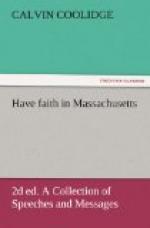Rightly viewed, then, this day is set apart for an examination of ourselves by recounting the deeds of the men of long ago.
What was there in the events of the seventeenth day of June, 1775, which holds the veneration of Americans and the increasing admiration of the world? There are the physical facts not too unimportant to be unworthy of reiteration even in the learned presence of an Historical Society. A detachment of men clad for the most part in the dress of their daily occupations, standing with bared heads and muskets grounded muzzle down in the twilight glow on Cambridge Common, heard Samuel Langdon, President of Harvard College, seek divine blessing on their cause and marched away in the darkness to a little eminence at Charlestown, where, ere the setting of another sun, much history was to be made and much glory lost and won. When a new dawn had lifted the mists of the Bay, the British, under General Howe, saw an intrenchment on Breed’s Hill, which must be taken or Boston abandoned. The works were exposed in the rear to attack from land and sea. This was disdained by the king’s soldiers in their contempt for the supposed fighting ability of the Americans. Leisurely, as on dress parade, they assembled for an assault that they thought was to be a demonstration of the uselessness of any armed resistance on the part of the Colonies. In splendid array they advanced late in the day. A few straggling shots and all was still behind the parapet. It was easier than they had expected. But when they reached a point where ’tis said the men behind the intrenchments could see the whites of their eyes, they were met by a withering fire that tore their ranks asunder and sent them back in disorder, utterly routed by their despised foes. In time they form and advance again but the result is the same. The demonstration of superiority was not a success. For a third time they form, not now for dress parade, but for a hazardous assault. This time the result was different. The patriots had lost nothing of courage or determination but there was left scarcely one round of powder. They had no bayonets. Pouring in their last volley and still resisting with clubbed muskets, they retired slowly and in order from the field. So great was the British loss that there was no pursuit. The intensity of the battle is told by the loss of the Americans, out of about fifteen hundred engaged, of nearly twenty per cent, and of the British, out of some thirty-five hundred engaged, of nearly thirty-three per cent, all in one and one half hours.
It was the story of brave men bravely led but insufficiently equipped. Their leader, Colonel Prescott, had walked the breastworks to show his men that the cannonade was not particularly dangerous. John Stark, bringing his company, in which were his Irish compatriots, across Charlestown Neck under the guns of the battleships, refused to quicken his step. His Major, Andrew McCleary, fell at the rail fence which he had held during the day. Dr. Joseph Warren, your own son of Roxbury, fell in the retreat, but the Americans, though picking off his officers, spared General Howe. They had fought the French under his brother.




